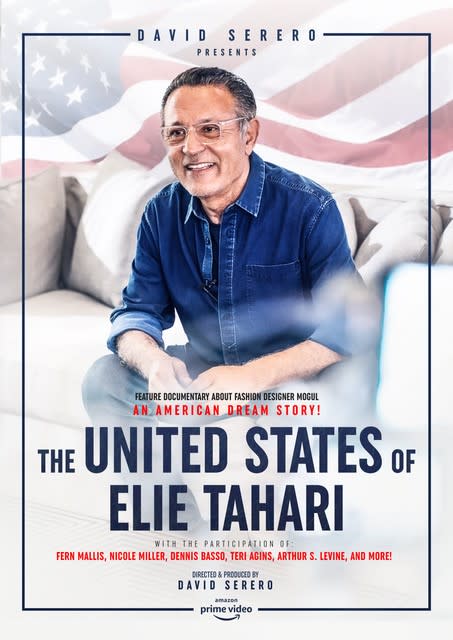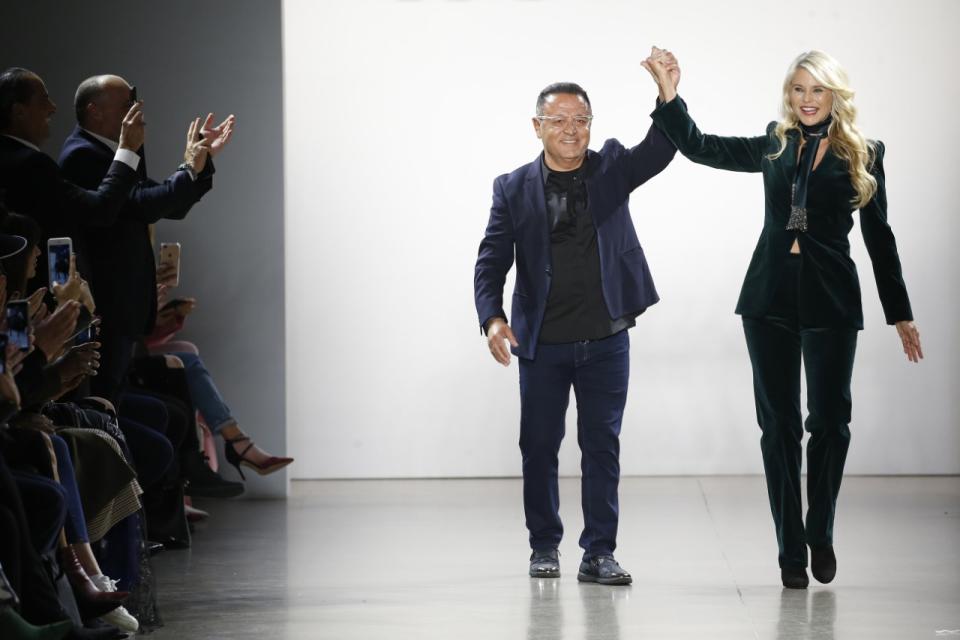Elie Tahari Documentary Explores the Designer’s Rise

Elie Tahari’s life story is clearly the pursuit of the American Dream.
His life and career is the subject of a new documentary, “The United States of Fashion Designer Elie Tahari,” that is available throughout the month on Vimeo for subscribers. Written, directed and produced by David Serero, the film illustrates how Tahari started with literally nothing and came to the U.S. to pursue his dreams. With grit, determination, and a lot of chutzpah, he built what was at one point a $1 billion fashion empire.
More from WWD
“I’m very proud of the final film, but what I’m most proud of is that my kids will now know my story, which will hopefully be an inspiration for them as much as I hope it will be for others,” said Tahari in an interview. He never really thought about becoming the subject of a documentary, although, “every once in a while I thought my life story would make a great movie, but I think everyone thinks that about their life, but I never thought about a documentary.”
Serero explained why he decided to take on the project: “Elie is such an inspiration and someone I really look up to. He is the definition of courage, hard work, determination and pure, genuine kindness. As high as he went, he never forgot his roots, and he cares deeply about each of his customers and employees,” said Serero.
Tahari was born in Israel in 1952, moved to Iran and then returned to Israel where he lived with his family in a tent with no electricity or indoor bathroom. His mother had epilepsy so he was sent to live in an Israeli orphanage where they washed his clothes and gave him shoes once a year. He later joined the Air Force School to learn to become a trade mechanic. When he came home, his father said they didn’t have room for him.

Tahari headed to New York because his brother was a messenger for El Al Airlines and he was able to get a free ticket. With less than $100 in his pocket, he initially stayed at the YMCA, but ran out of money and slept on a bench in Central Park. Eventually, he got a job working for an electrical contractor in the Garment District changing light bulbs.
Seeing models going in and out of the building, he realized he was in the wrong job. He went from store to store looking for a job and got one in a boutique selling clothes. He gave the owner the idea to sell tube tops and “that’s what started my career in fashion,” says Tahari in the film.
It was the 1970s and the hippie movement was in full swing. Tahari found the tube tops on Orchard Street and they were one size fits all. He bought a dozen and brought them to the store to show his boss. Customers started fighting over them.
Eventually he owned his own store and decided to show his line at the Boutique Show at the Hotel McAlpin. They wouldn’t let him because the show was sold out, so he snuck in and sold items in the hallway on the top floor, until he was chased to another floor. Tahari sold 250,000 pieces for $2 apiece. The $500,000 started his career. “I couldn’t produce as many orders as I had,” he said.
Being resourceful has been Tahari’s calling card.
Using archival photos and videos, the documentary shows how Tahari became an important brand name in the ’80s and ’90s, catering to the working woman who needed clothing for the office and special occasions. It explores his creative process and how he dressed many generations. Nicole Miller, Fern Mallis, Dennis Basso, Melissa Rivers and Teri Agins share their insights on his success and why his line resonated so much with his customers. “His clothes were ageless,” said Rivers, noting that they appealed to moms and their daughters. Her mother, Joan Rivers, was a fan and customer.
“The quality and tailoring was just perfection,” said Miller. Agins echoed that “Elie understands a commercial fit.”
Mallis recalled that the line launched and “very quickly it was everywhere.”
Tahari opened up a shop in Bloomingdale’s, where he was generating $2,500 per square foot, more than they did in cosmetics. That was followed by Saks Fifth Avenue, Neiman Marcus and Nordstrom, as he worked his way to becoming a leading sportswear brand.

courtesy shot.
Other moments in Tahari’s life explored in the film include showing at Studio 54; going to the White House and meeting Hillary Clinton, who often wore his clothes; striking a deal with Kohl’s for DesignNation; becoming a member of the CFDA; launching Theory; former New York City Mayor Michael Bloomberg declaring Elie Tahari Day on Tahari’s 40th anniversary in business in 2013, with an appearance by Joan Rivers; owning his own building at 510 Fifth Avenue with floor-to-ceiling windows, and appearing on “Project Runway All Stars.”
“I wasn’t a great businessman. I was fearless because I had nothing and had nothing to lose. Successful in business doesn’t mean you’re successful in life,” said Tahari, in the documentary. “At the time, I had no wife, no family or girlfriend. I had nothing to lose, so I tried everything.”
Today, Tahari has two children, “who give me inspiration,” he said in the film.
The designer, who shut his business during the early days of the pandemic, is back in business with his designer line.
“Yes, I am, and we have a great business on our digital flagship store, elietahari.com,” he said. The company has opened five new collection stores including Brickell in Miami and Aventura, Santa Monica in California and at the Garden State Plaza in New Jersey, in addition to his outlet locations, “so the business is good, thank God,” he said in the interview.
When asked what he attributes his enormous drive to, and what kept him going despite numerous disappointments, Tahari told WWD, “When I arrived in America, I knew the moment I got here that I wanted to stay, which was a huge motivator, but I was really driven by and for my family. The more success I had, the more I could help my family and change the direction of my life. In the beginning, I was making so many mistakes and losing money, but I knew that the next year if I didn’t make those same mistakes that I would be able to keep going. The excitement of designing clothes, creating new products and dressing beautiful people were goals that became closer and closer to reality,” said Tahari.
Meanwhile, Tahari said he doesn’t feel he’s ever gotten the recognition he deserved in the industry. “I was never part of the clique or the in crowd. I was running a business with over 1,000 employees and points of sales around the world and made a lot of money for my partners, wholesalers and licensees. I see so many people getting awards in this industry, who are very inaccessible to the public and almost have no business. I don’t really understand what it’s for but maybe one day I’ll get an award. No one has given me as much recognition as my customers, which I’m very grateful for and humbled by.”
Asked what he anticipates people will take away from the documentary, Tahari said, “Hope. I want people to believe that anything is possible and I especially want my kids to learn that from their dad. No matter where you are in life, you can achieve and dream and make it to the top if that’s what you want, but don’t let other people define your idea of success. Be true to yourself and the goals you set for yourself.”
The designer’s favorite part of the documentary was that “it made me realize how lucky I am to have experienced this life and to have been able to go from being without shoes to dressing all of the beautiful people. So many people still come up to me and tell me they wore one of my suits to their first job interview, and it empowered them and they got the job and that’s such an honor for me.”
Despite how difficult the business is today, Tahari still feels a person can come to America with less than $100 and build a company like he did. “Absolutely. I think it’s much harder now, but all kinds of fashion businesses are opening now and if you’re willing to work and you have what the consumer wants and you have passion and a dream and work hard, you can achieve anything. At least that’s what I still believe,” he said.
These days, it seems very difficult for an independent brand to survive.
“Yes, it’s much more difficult in my opinion. There are a lot of businesses that are doing well, but you have to be well versed in so many more areas. I also think there is a lot of brand confusion for the consumer and people also don’t want to wear or have one brand define them. So it’s very difficult to become a large global brand and be independent,” he said.
Tahari said he had no say in the editing or final cut of the documentary, and he gave Serero full access to Tahari’s digital and video archives.
As for the hardest parts of making the documentary, Serero said, “To be able to contain his incredible journey in one hour and also to be able to include all the masterclass parts and provide a window into the secrets of his creative process. The other people I interviewed, like Fern Mallis, Teri Agins and Nicole Miller, were also so inspiring and generous with their time and passion. If it were up to me, I would have released a 10-hour movie. My priority was to condense 45 years of fashion and anecdotes while making it entertaining, instructive and inspiring. As it’s a fashion documentary, I wanted moments of ‘pure fashion’ without any comments, besides background music, so people can appreciate the master craftsmanship of Elie Tahari, and the quality of his work.”
Serero said Tahari was open about his life, moods and personal life. “Elie is so generous with his story and is ready to tell and share his legacy. Elie is all about sharing. I wanted to know what can not be found on Google — especially all that led him to start in fashion and his challenges, and what he was feeling inside during his journey.”
The documentary is now touring several film festivals. Serero decided to make it available on VOD for a limited time to coincide with the fashion collections and shows in the U.S. and Europe. It has received such awards as Best Documentary from Cinema of the World, Best Director on a Documentary by the Berlin Independent Film Festival, Best Producer Award by the Eastern Europe International Movie Awards and Honorable Mention at the London International Film Festival, among others.
FOR MORE STORIES:
Elie Tahari’s Life Becomes a Documentary
Elie Tahari Reflects on 45 Years in Business, While Looking Ahead
Sign up for WWD's Newsletter. For the latest news, follow us on Twitter, Facebook, and Instagram.
